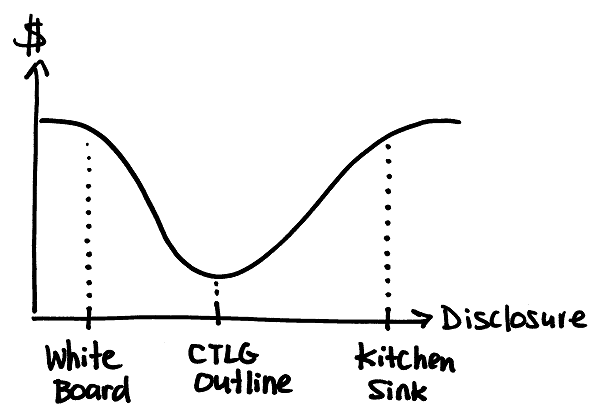How to control the cost of filing a patent.

How much does a patent application cost? That is a good question. One that we are asked frequently at Clock Tower Law Group. The typical answer is “It depends,” because each patent application is unique. I have known others to answer the question with another question: “How long is a string?” Of course it’s hard to budget against an “it depends” amount.
So I drew the above drawing.
This is a drawing of patent costs vs. disclosure. It’s an inverted bell curve with a nonzero minimum. In our experience, the length of the disclosure (i.e. the details of the invention) that we receive is the biggest factor in the cost of a patent application.
- On the left side of the drawing is the white board disclosure. We have a single meeting with the inventor, he/she writes the details of the invention on a white board. We take notes. And the inventor tells us “Go forth and file.” So we have to create the patent specification from whole cloth. This is one way to maximize the expense of a patent filing.
- On the right side of the drawing is the kitchen sink disclosure. The inventor sends us piles of technical documents, piles of prior art, and piles of related documentation. We have to sift through all of it to figure out which stuff is relevant and which is not. This is another way to maximize the expense of a patent filing.
- In the middle of the drawing is Clock Tower Law Group’s patent outline. We originally wrote the outline for internal use. The outline walks us through the process of writing a patent and includes examples of what to put in each section. Through the years, we have been sharing this (admittedly lengthy) document with our clients so that they can take a crack at writing a first draft of the patent specification. In other words, we’ve found that the way to minimize the cost of a patent filing is for our clients to let us prompt them for the needed info.
There are other factors as well. Inventions – like cars or houses – vary in complexity. Also, if you are a good email communicator, then that is a good way to decrease the cost of a patent filing.
In 2006, the USPTO patent allowance rate was 54%, the lowest percentage ever. Which means that your chances of getting a patent today are only slightly better than getting heads on a coin flip. So what should you do to increase your odds? You should do a patent search (even though a patent search is not required). You should file a patent application only if it makes sense. And you should write patents that are easy to read.
Which brings me back to the original question. How much does a patent cost? OK, here are some actual numbers from my firm Clock Tower Law Group. Over the last five years:
- The average cost of filing a patent application was $11,500.
- But there is a large standard deviation in the above number. Two-thirds of our patent filings were between $7,000 and $17,000. It could cost more or less. More if we have too much or too little of a disclosure. Less if you use our outline.
- The cost of the initial patent filing equals about 50% of the total cost. If you spent $15,000 to file a patent application, then budget another $15,000 (2-5 years later) to finish it up (office actions and the like).
Some people may say that I am crazy for disclosing these numbers. I think not. I tell these numbers to every prospective client. It does me no good to set a client’s expectations that costs will be low and then go way over budget. And if I’m buried with new business as a result of this blog post, then I suspect that our hourly rates will increase to correct that “problem.” So if there are prospective clients who take their business elsewhere after seeing these numbers, then that’s probably best for both parties. We are not the perfect law firm for every company. We are not the most expensive. We are not the least expensive. Nor do we believe that cost alone is a good way to choose a law firm.
Related Posts
- Drawing That Explains Provisional Patent Applications
Provisional patent applications are rarely the best solution for startups. - Drawing That Explains Patent Disputes
And what’s wrong with law school education. - Drawing That Explains Patent Laws
From Chief Justice to the patent examiner. - Drawing That Explains Copyright Law
Copyright rights, unregulated uses, and fair use. - (Drawing That Explains) How To Debug Computer Problems
Let’s work the problem people! - How To Get And Defend A Patent Without Going Broke
It is possible for independent inventors and small businesses to acquire patents and protect their ideas without going broke in the process. - Software Patents: Good Or Evil? (Part 1)
My materials from the fourth annual Law and Technology Conference at the Technology Law Center of the University of Maine School of Law. - Patents vs. Trade Secrets
The advantages and disadvantages of protecting business ideas with patents and trade secrets.

